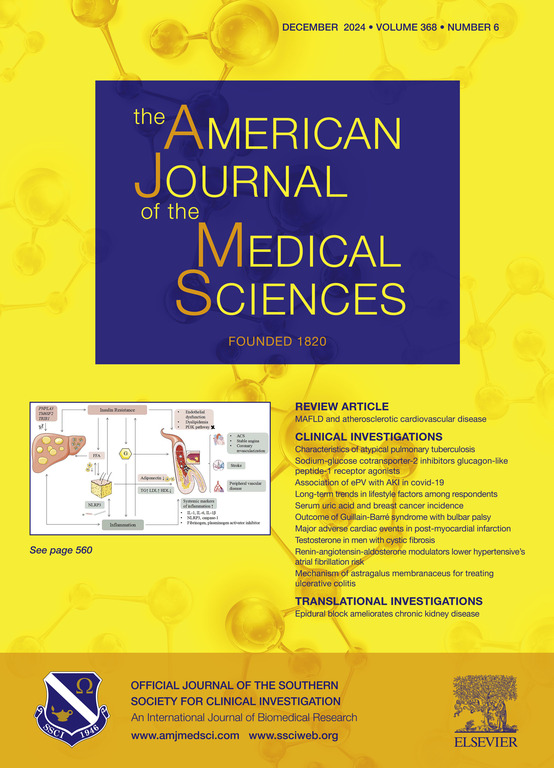Cardiovascular health and gender minority stress in transgender and gender diverse adults: A cross-sectional study
IF 1.8
4区 医学
Q2 MEDICINE, GENERAL & INTERNAL
引用次数: 0
Abstract
Background
Transgender and gender diverse (TGD) people may take gender affirming hormone therapy (GAHT) to affirm their gender identity and improve quality of life. The cardiovascular health (CVH) impacts of GAHT are not well described. TGD individuals may also experience gender minority stress (GMS), typically caused by discrimination and transphobia, which may adversely affect CVH. The purpose of this study is to evaluate the CVH and gender minority stress of TGD adults receiving GAHT.
Methods
This observational study was approved by the Emory University Institutional Review Board. TGD adults (18–75 years) were recruited from Emory endocrinology outpatient clinics. CVH was measured using American Heart Association’s Life’s Essential 8 (LE8) tool. Data from electronic medical records were combined with administered questionnaire responses to calculate LE8 and GMSR scores.
Results
From October 2023 to April 2025, 98 TGD adults were screened and 95 were enrolled. Nine participants were excluded for incomplete questionnaires and/or medical records. Of 86 participants (mean age: 33.8 ± 1.4 years) with complete data, the mean LE8 score was 69.4 ± 1.3 and there was no significant difference based on sex assigned at birth. The lowest three sub scores were diet (37.7 ± 1.8), body mass index (BMI) (61.6 ± 4.0), and physical activity (63.4 ± 3.9), matching the lowest three subscores found in the general United States population. No statistically significant associations were found between GMSR and LE8 scores in this study.
Conclusions
Factors beyond hormone therapy such as diet, BMI, and physical activity should be considered for driving CVH deficits in the TGD adult population. Further research is needed to understand longitudinal changes in CVH and the impact of GMS on CVH.
跨性别和性别多样化成人的心血管健康和性别少数派压力:一项横断面研究
背景:跨性别及性别多元(TGD)人群可通过性别肯定激素治疗(gender affirming hormone therapy, GAHT)来肯定其性别认同,提高生活质量。GAHT对心血管健康(CVH)的影响尚未得到很好的描述。TGD个体也可能经历性别少数派压力(GMS),通常由歧视和变性恐惧症引起,这可能对CVH产生不利影响。本研究的目的是评估接受GAHT治疗的TGD成人的CVH和性别少数派压力。方法:这项观察性研究得到了埃默里大学机构审查委员会的批准。TGD成人(18-75岁)从Emory内分泌门诊招募。CVH采用美国心脏协会的生命基本8 (LE8)工具测量。电子病历数据与问卷调查结果相结合,计算LE8和GMSR评分。结果:从2023年10月至2025年4月,筛查了98名TGD成人,入组95人。9名参与者因问卷和/或医疗记录不完整而被排除在外。在86名数据完整的参与者中(平均年龄:33.8±1.4岁),平均LE8评分为69.4±1.3,出生性别差异无统计学意义。最低的三个分项是饮食(37.7±1.8)、身体质量指数(BMI)(61.6±4.0)和身体活动(63.4±3.9),与美国一般人群中最低的三个分项相匹配。本研究未发现GMSR与LE8评分有统计学意义的关联。结论:激素治疗之外的因素,如饮食、BMI和身体活动,应考虑在TGD成人人群中驱动CVH缺陷。需要进一步研究CVH的纵向变化以及GMS对CVH的影响。
本文章由计算机程序翻译,如有差异,请以英文原文为准。
求助全文
约1分钟内获得全文
求助全文
来源期刊
CiteScore
4.40
自引率
0.00%
发文量
303
审稿时长
1.5 months
期刊介绍:
The American Journal of The Medical Sciences (AJMS), founded in 1820, is the 2nd oldest medical journal in the United States. The AJMS is the official journal of the Southern Society for Clinical Investigation (SSCI). The SSCI is dedicated to the advancement of medical research and the exchange of knowledge, information and ideas. Its members are committed to mentoring future generations of medical investigators and promoting careers in academic medicine. The AJMS publishes, on a monthly basis, peer-reviewed articles in the field of internal medicine and its subspecialties, which include:
Original clinical and basic science investigations
Review articles
Online Images in the Medical Sciences
Special Features Include:
Patient-Centered Focused Reviews
History of Medicine
The Science of Medical Education.

 求助内容:
求助内容: 应助结果提醒方式:
应助结果提醒方式:


